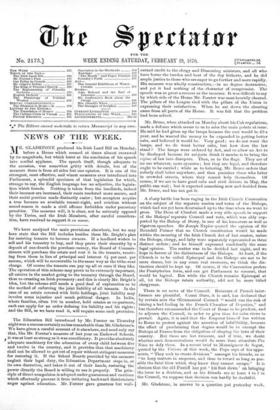The Education Bill introduced by Mr. Forster on Thursday night
was a success certainly noless remarkable than Mr. Gladstone's. We have given a careful account of it elsewhere, and need only say that, like Mr. Forster's measure of last year on Endowed Schools, it was at least as strong as it was conciliatory. It provides absolutely adequate machinery for the education of every child between five and twelve in the country, and it provides that that machinery shall not be allowed to get out of repair without stringent measures for restoring it. If the School Boards provided by the measure neglect their legal duty, the Education Department steps in, at its own discretion, and takes it out of their hands, restoring the power directly the Board is willing to use it properly. The prin- ciple of direct compulsion is adopted under guarantees and cautions which effectually prevent it from irritating backward districts into anger against education. Mr. Forster gave generous but well-
earned credit to the clergy and Dissenting ministers, and all who have borne the burden and heat of the day hitherto, and he did ample justice to those who are eager to go further and more rapidly. His measure was wholly constructive,—in no degree destructive, and yet it had nothing of the character of compromise. The speech was as great a success as the measure. It was difficult to say by which side of the House Mr. Forster was most heartily cheered. The pillars of the League vied with the pillars of the Union in expressing their satisfaction. When he sat down the cheering came from all parts of the House. It was felt that the problem had been solved.
































